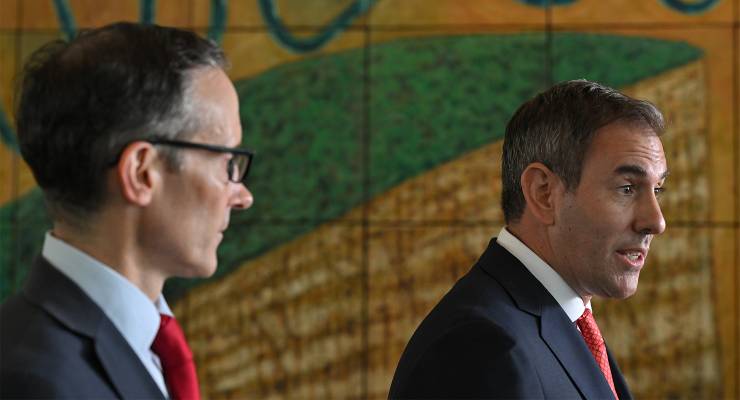
The Australian Competition and Consumer Commission’s (ACCC) boss Gina Cass-Gottlieb will get the power to block mergers under sweeping reforms announced by Treasurer Jim Chalmers.
These changes would bring Australian law into line with most of the developed world, requiring acquisitions above a certain size to be reported automatically, rather than the bonkers-sounding current approach of it being voluntary. For example, the ACCC has only scrutinised 330 mergers annually on average over the past decade — 1,400 mergers were recorded last year alone.
That’s consistent with a broader average this century. As Crikey wrote earlier this year, data developed in collaboration with the Reserve Bank and Australian National University shows that the watchdog is missing the majority of mergers. Further, the trend towards concentration has been exacerbated by the fact that just 1% of firms make half of all acquisitions.
Moving forward, Cass-Gottlieb will have the power to block serial acquisitions as well as those that make market leaders. What impact, we wonder, would the new reforms have had on the following mergers?
ANZ-Suncorp
The merger of the banking arms of ANZ and Suncorp was the most conclusive recent test of our competition laws, as Bernard Keane and Glenn Dyer wrote in these pages, describing it as a “classic demonstration of lazy Australian capitalism“. The ACCC attempted to halt it and there was an inevitable appeal to the Australian Competition Tribunal. A reversal of the decision by the tribunal would be definitive proof, wrote Dyer and Keane, that “our competition laws are too weak to give Australians the competition they deserve”.
Guess what happened.
The tribunal reversed the block and allowed ANZ to acquire Suncorp Bank, arguing the deal “would not lead to any substantive change in the structure of the market”. The competition watchdog admitted defeat and didn’t appeal.
Origin Energy-Brookfield
Of course, new powers are one thing, but the watchdog has to actually use them. The ACCC failed to stop Brookfield’s purchase of Origin’s energy markets business despite finding it would cause a substantial lessening of competition, which would normally cause the deal to fail the threshold test under competition law.
Brookfield owns nearly half of AusNet, which dominates electricity transmission in Victoria, as well as a gas distribution business and a smart meter business. However, the ACCC decided this level of concentration was fine because it would facilitate “an acceleration of renewable generation and storage development for Origin Energy Markets”.
Media mergers
In 2016, Australia’s two biggest media moguls, Rupert Murdoch and Kerry Stokes, joined forces when The West Australian bought out Murdoch’s The Sunday Times, turning Perth into essentially a one-paper town.
By 2019, Stokes had bought News Corp’s stake in the Community News Group, putting almost every print publication in Western Australia under the control of Stokes, who also owns Channel Seven. Most pertinently for our purposes is the merger of the two papers in WA’s capital.
In September 2016, the competition regulator announced it wouldn’t oppose the deal, saying while there would be fewer voices in the media for consumers, on balance, there wouldn’t be significantly less competition for consumers or advertisers.
Further, the watchdog didn’t oppose the Nine-Fairfax merger in 2018, with much the same explanation.
Banking services
In 2021 an industry committee was established to push for a three-way merger of BPAY, EFTPOS and the New Payments Platform (NPP). It was packed with shareholders from powerful companies, such as the big four banks, Coles, Woolworths, Macquarie Bank and HSBC.
Ten business associations made submissions to the ACCC calling for it to block the move, arguing it would reduce competition, reduce access to least-cost routing and increase the cost of transactions for small businesses.
After accepting a court-enforceable undertaking from the parties, the watchdog waved it through, with then chairman Rod Sims saying he was comfortable the amalgamation would not “substantially lessen competition in any payments market, after taking into account the court-enforceable undertaking”.
Woodside-BHP
In August 2021 it was first reported that BHP might be selling its petroleum assets to Woodside for what was then estimated at $20 billion. While the deal had the potential to create a monstrous climate change behemoth with even greater ability to sway policy than Woodside (an employer of choice for former pollies) already had, from a competition point of view the ACCC had no great issues: they announced they would not oppose the deal in December that year.








On the one hand we are remarkably strong on regulating individual behaviour, to the point of being known worldwide as a nanny state, and on the other hand we are laughably weak on regulating corporations and bag business, being known world wide for having some of the weakest and most ineffective competition and consumer protection laws in the developed world.
Regulatory authorities in Australia are mostly toothless and easily captured by vested interests. In the very rare occasions where they do take action, the penalties are relatively minor and more of a minor annoyance than a serious deterrent.
“Nanny state” is one of those phrases that allows the user to assume an argument was won without the tedious effort of actually joining in. Like most generalisations, it requires no thought and as a direct result is very popular. Australia is plausibly “nanny” only if compared to “gangster” states like Congo, Russia and the US. It is much preferable to the alternative.
The big corporations make sure their various regulators always do what they are told. The regulators are only people and those people know which side their bread is buttered